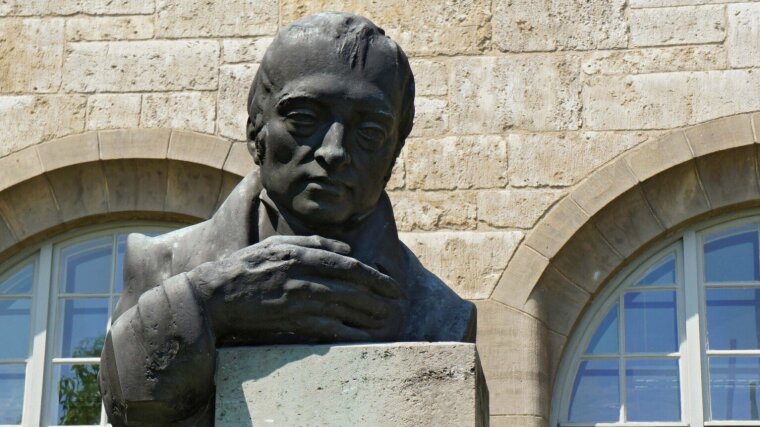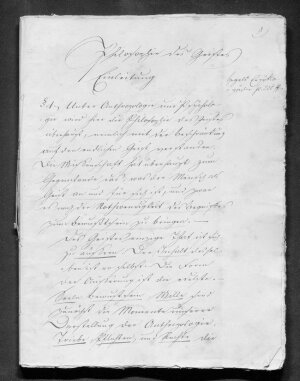
- Research
Published: | By: Ursula Hinterberger
The first page of the transcript of Hegel's lecture "Philosophy of Spirit".
Image: Archiv und Bibliothek des Erzbistums München und FreisingThe discovery of previously unanalysed lecture notes in the Diocesan Library of the Archdiocese of Munich and Freising provides new approaches to the thought of the famous philosopher Georg Wilhelm Friedrich Hegel (1770-1831). Various parts of Hegel's philosophy are mostly documented only by transcripts of his lectures, which thus have outstanding significance for Hegel's insights and allow insights into his philosophising as a "work in progress". Hegel biographer and researcher Professor Klaus Vieweg of the Friedrich Schiller University Jena found five archive boxes in the diocesan library of the Archdiocese of Munich and Freising containing narrowly written notebooks and papers that had not been closely examined by researchers for almost 200 years. Vieweg is enthusiastic: "Such a highly surprising and fortunate discovery probably only happens once in a lifetime and is comparable to finding a new Mozart score."
The transcripts, comprising some 4,000 pages, were penned by Friedrich Wilhelm Carové (1789-1852), one of Hegel's first students at Heidelberg University. The Catholic writer, publicist and politician was one of the leading intellectuals of his time. The manuscripts now discovered are part of the estate of the theologian Friedrich Windischmann (1811-1861), professor of Catholic theology in Munich, cathedral chaplain and vicar general of the archdiocese of Munich and Freising from 1846 to 1856. He was the son of the Bonn-native philosophy professor and physician Karl Joseph Hieronymus Windischmann (1775-1839), who was in contact with Hegel and received the transcripts as a gift from Carové.
Universities of Jena and Bamberg prepare edition of Hegel manuscripts
The manuscripts comprise almost all parts of Hegel's encyclopaedic architectonics, including a long-sought transcript of an Aesthetics lecture in Heidelberg, about which no other records exist. They are being prepared for a comprehensive edition under the title "Carovés Hegel-Mitschriften" by Professors Klaus Vieweg (University of Jena) and Christian Illies (University of Bamberg) with the support of Privatdozent Marko Fuchs (University of Bamberg) and international experts as part of a multi-year academic project; accompanying studies are planned also. The Brougier-Seisser-Cleve-Werhahn Foundation for the Promotion of Culture and Science is supporting the transcription of the manuscripts into a rough draft with a position at the University of Bamberg.
The manuscripts came to the former Freising Cathedral Library as the estate of Friedrich Windischmann, whose holdings are now part of the diocesan library of the archdiocese. The estate was catalogued as part of the library's manuscript collection; its existence was also known via the online portal "Kalliope", a Germany-wide reference tool for estates, autographs and publishing archives. In 1988, the researcher Willi Ferdinand Becker (Bonn) pointed out in his essay "Hegel und Bonn. Fundstücke einer Spurensuche" (Hegel and Bonn: Findings from a Search for Traces), Becker pointed out that "Windischmann's estate is waiting to be processed in the Freising Cathedral Library". But it was not until the Jena philosopher Klaus Vieweg followed up on this hint, in the summer of 2022, that he subjected the material to a thorough review and recognised its full significance. He was assisted by Martin Walko, senior librarian at the diocesan library. Beforehand, the manuscripts, which had been affected by earlier unfavourable storage conditions, had been cleaned by a paper restorer and thus made usable again.
Professor Johannes Merz, Director of the Archive and Library of the Archdiocese of Munich and Freising, has promised his support to the research team.
07743 Jena Google Maps site planExternal link
